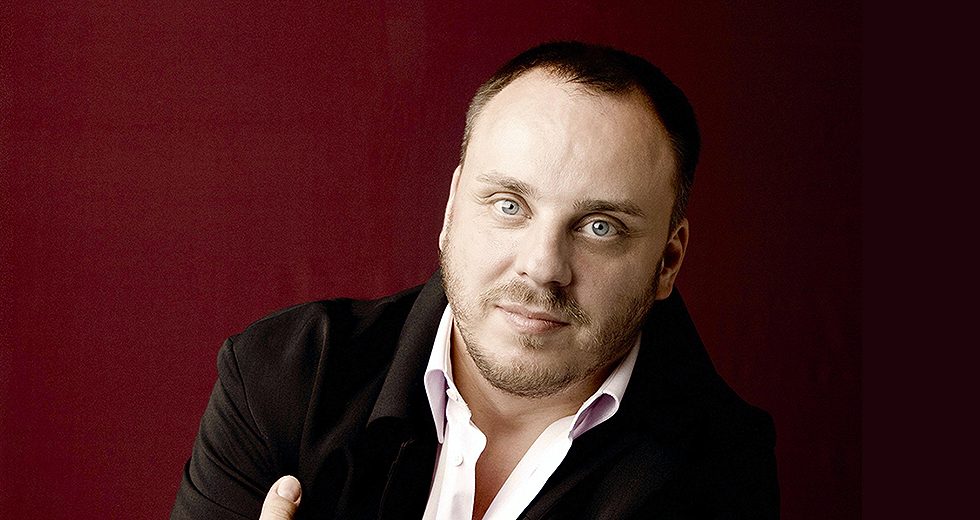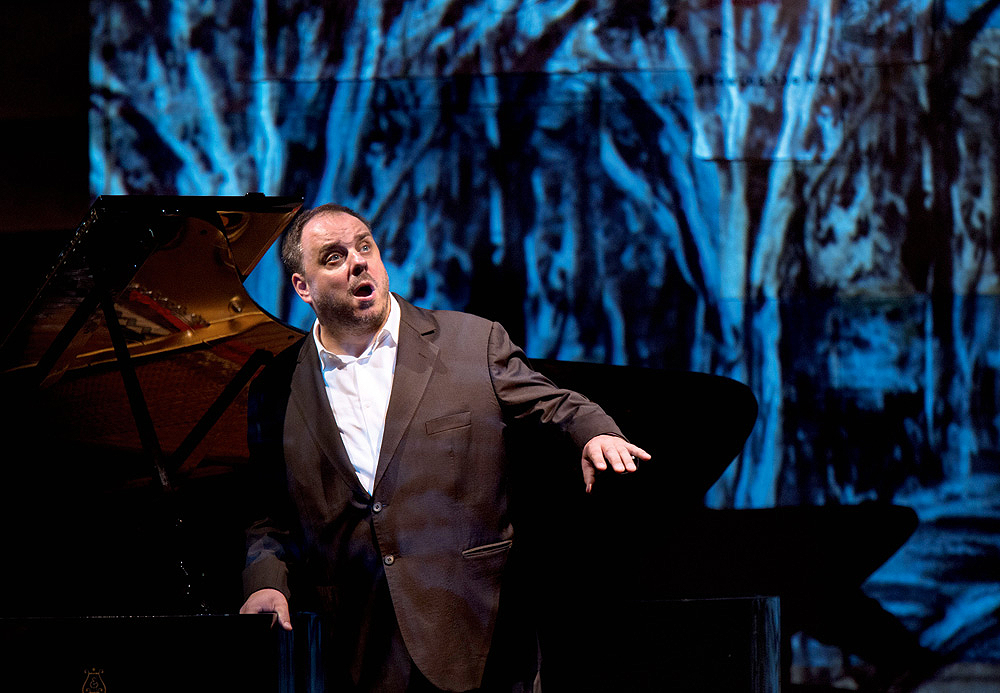
Few singers are more esteemed for their musical intelligence and expressive depth than German baritone Matthias Goerne. Unlike many whose stardom has been achieved chiefly in opera, Goerne has forged a multifaceted career focused on symphonic works and lieder. His teachers included soprano Elisabeth Schwarzkopf and baritone Dietrich Fischer-Dieskau, who were both renowned interpreters of the art-song repertoire.
“Mr. Goerne is an ideal singer of lieder,” wrote New York Times critic Anthony Tommasini about a 2014 performance of Franz Schubert’s great song cycle, Winterreise, for which the singer is especially acclaimed. “His voice is strong, dark and rich. Though he can easily summon chesty power and chilling intensity, he also can bend a phrase with tenderness and focus his sound into streams of ethereal lyricism.”
Goerne typically spends at least four weeks in the United States each year, usually performing orchestral concerts and recitals. This year, he has engagements with six of this country’s top orchestras, including the Philadelphia Orchestra, San Francisco Symphony and Dallas Symphony, where he has served as the 2016-17 artist-in-residence. He also returns April 13-15 to Symphony Center to join the Chicago Symphony Orchestra and Chorus and soprano Chen Reiss in of Gabriel Fauré’s Requiem in D Minor, Op. 48.

Matthias Goerne is celebrated as a performer of lieder, especially Schubert’s Winterreise. | Photo: Harmonia Mundi
Written in 1887-’90, the French composer’s setting of the Catholic mass for the dead is hardly unknown but it is infrequently performed. Georne described the piece as “brilliantly made and extremely refined,” with moments of power but an overall sense of delicacy. “It’s a very sensitive and fragile piece, and I like it very much,” he said. “I’m not often singing this, because also in Europe, it’s here and there, but it’s not one of the most popular pieces. I think it’s really a masterpiece.”
To be properly performed, he said, “it needs a lot of control and taste, especially taste, because it’s pretty much introverted in its expression.” He’s confident that the Chicago Symphony and Chorus and guest conductor Charles Dutoit can deliver just such a nuanced interpretation. “I think he is one of the greatest conductors I have ever met,” Goerne said. “The eloquence, the efficiency, the sensitivity, the knowledge and the influence just by conducting and not just talking. The way he can rehearse pieces. The sense for aesthetics and style. I like very much to work with him.”
Georne spoke from Vienna, where he was singing the role of Kurwenal in the Vienna State Opera’s production of Tristan und Isolde, one of a small number of carefully selected roles in which he appears, including Wolfram in Wagner’s Tannhäuser, Bluebeard in Bartók’s Bluebeard’s Castle and Mathis in Hindemith’s Mathis der Maler. He also is reputed for his portrayal of the title character in Alban Berg’s groundbreaking 20th-century opera Wozzeck. In August, he reprises the role at the Salzburg Festival, fulfilling a longtime dream.
During one of his first concert appearances at the event, he recalls sitting in on rehearsals of Wozzeck with famed conductor Claudio Abbado and imagining what it would be like to perform the opera some day at the international festival.
Making the upcoming production even more special is the production’s director, William Kentridge, a celebrated South African artist acclaimed for his imaginative operatic stagings. The two worked together when Kentridge created a film of animated black-and-white drawings that accompanied Goerne’s performance of Winterreise. Goerne has presented this multimedia version of the song cycle — what he called a “wonderful project” — in more than 35 concerts worldwide. “I know him quite well,” Goerne said of the artist-director. “He is a fantastic, sophisticated, educated, intelligent and reflective person — a wonderful human being as well as an artist. When you look at what he is doing, there is nothing similar.”
Typically, though, Goerne performs in only two or three staged opera productions each year. He dislikes the multiple weeks that are required for rehearsals and performances as well as the inevitable down time. He has a kind of musical wanderlust, always wanting to expand his repertoire or perform with someone new. Sure, he could have an “easy and comfortable life” traveling from one music center to the next with a handful of operatic roles, three or four concert pieces and a couple of art-song cycles. “But that’s really the opposite of what I have in mind and what I want to do,” he said. “I like very much to change pianists, to have different kind of personalities behind the piano, to change repertoire quite often.”
Indeed, Goerne likes to keep busy in general, he said, because it’s so easy for a singer to lose his or her vocal conditioning and pinpoint technique. He occasionally takes four- to five-day breaks, because he can get back in performing shape after such hiatuses with just a few rehearsals. But he rarely takes longer vacations. “It’s quite a hard process, then, to come back,” he said. “Usually, even when I have no concerts for three weeks, I put a recording project in the middle of it. I do not stay too long without using the voice.”
Kyle MacMillan, former classical music critic of the Denver Post, is a Chicago-based arts journalist.
TOP: Matthias Goerne observes of Fauré’s Reqiuem: “I think it’s really a masterpiece.” | Photo: Marco Borggreve